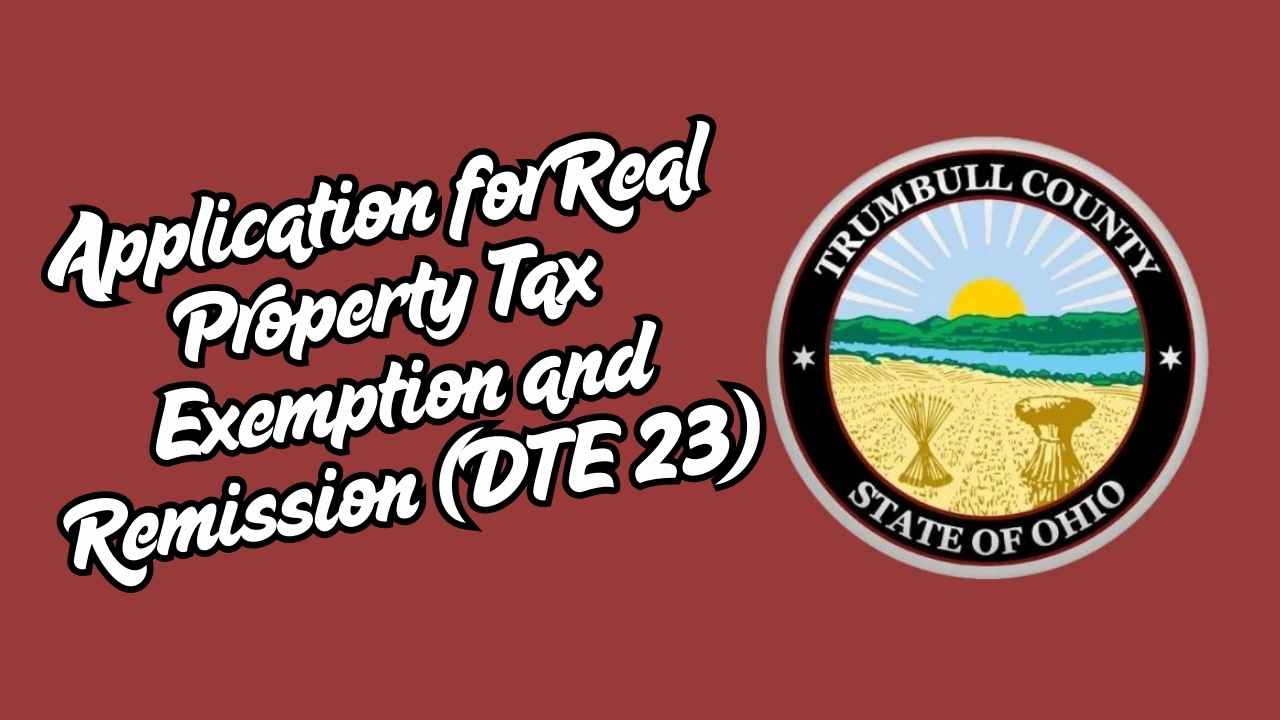In Trumbull County, Ohio, property owners can apply for tax breaks using Form DTE 23. This form is from the Ohio Department of Taxation. It helps groups like charities and churches save on property taxes for certain uses.
This article will help you understand how to apply for a DTE 23 in Trumbull County. We’ll cover who can apply and how to do it step by step. This way, you can save on your property taxes.
What Is the DTE 23 Form?
The DTE 23 form is used in Ohio to apply for tax exemptions. It’s for properties owned by nonprofits, churches, or government bodies. In Trumbull County, the Auditor’s Office checks if a property qualifies for tax relief.
Why Apply for a Real Property Tax Exemption?
Property taxes can be expensive. Exemptions can lower or remove these costs. This lets organizations focus on community services instead of taxes.
For example, a church can use the savings for local programs.
Who Can Apply for DTE 23 in Trumbull County?
Not everyone can use the DTE 23 form. It’s mainly for specific groups or property uses. Here’s who usually qualifies:
- Nonprofit Organizations: Charities or community groups using property for public benefit.
- Religious Institutions: Churches or religious groups using property for worship or related activities.
- Government Entities: Public schools or government buildings used for public purposes.
- Certain Veterans’ or Fraternal Organizations: Groups like the American Legion, if the property is used for exempt purposes.
Individuals usually don’t qualify unless they’re part of an eligible organization. Always check with the Trumbull County Auditor’s Office for specifics.
Eligibility Requirements for DTE 23
To qualify for a tax exemption in Trumbull County, your property must meet certain rules. The Ohio Revised Code outlines these requirements. Here are the key points:
- The property must be owned by an eligible entity, like a nonprofit or church.
- The property must be used for an exempt purpose, such as charity, education, or religion.
- You must have owned the property for at least one year before applying.
- All taxes, assessments, penalties, and interest must be paid before submitting the form.
If your property doesn’t meet these rules, the exemption may be denied. Always double-check your eligibility with the Auditor’s Office.
How to Apply for DTE 23 in Trumbull County
Applying for a real property tax exemption in Trumbull County is straightforward but requires attention to detail. Follow these steps to complete the DTE 23 form correctly:
Step 1: Gather Required Information
Before filling out the form, collect key details about your property. You’ll need:
- Parcel numbers for all properties you’re applying for (found on your tax bill).
- The property’s street address or location.
- The date you acquired the property.
- Proof of the property’s exempt use (e.g., nonprofit status or program details).
Having these ready will make the process smoother.
Step 2: Download or Obtain the DTE 23 Form
You can find the DTE 23 form on the Trumbull County Auditor’s website (auditor.co.trumbull.oh.us). You can also pick up a physical copy at the Auditor’s Office in Warren, Ohio. The form is fillable online, which makes it easier to complete.
Step 3: Fill Out the DTE 23 Form
The DTE 23 form has several sections. Here’s a breakdown of what to include:
- Applicant Name and Address: Provide your name and where to send notifications.
- Parcel Numbers: List all parcels in the same school district.
- Property Details: Include acreage, address, and owner’s name.
- Exempt Use: Explain how the property is used (e.g., for charity or worship).
- Ohio Revised Code Section: Cite the specific code section that qualifies your property (e.g., ORC 5709.12 for charitable use).
Be clear and accurate to avoid delays.
Step 4: Submit the Application
Submit one original and one copy of the DTE 23 form to the Trumbull County Auditor’s Office. You can mail it to 160 High Street NW, Warren, OH 44481, or deliver it in person. The deadline to apply is December 31 of the year you seek the exemption.
Step 5: Await Approval
The Auditor’s Office will review your application and forward it to the Ohio Department of Taxation for final approval. You’ll get a notice by the first Monday in October stating whether your application was approved or denied. If denied, the notice will explain why.
What Happens After Approval?
If your DTE 23 application is approved, your property’s tax bill will be reduced or eliminated for the exempt portion. The exemption applies until the property’s use or ownership changes. You must notify the Auditor’s Office if this happens. For example, if a nonprofit stops using the property for charity, the exemption may end.
Common Reasons for Denial
Not all DTE 23 applications are approved. Here are some reasons why your application might be rejected:
- The property isn’t used for an exempt purpose.
- Taxes or penalties are unpaid at the time of application.
- The application is incomplete or lacks required documents.
- The property is owned by an ineligible entity, like a for-profit business.
If your application is denied, you can appeal to the Trumbull County Board of Revision. File Form DTE 106B within 60 days of the denial notice.
Other Tax Relief Options in Trumbull County
Besides the DTE 23 form, Trumbull County offers other ways to reduce property taxes. Here are a few programs:
- Homestead Exemption: For seniors (65+) or permanently disabled homeowners with low income. Shields up to $25,000 of home value from taxes. Use Form DTE 105A.
- Owner-Occupancy Credit: A 2.5% tax reduction for owners living in their homes. Apply with Form DTE 105A.
- Veterans’ Exemption: Disabled veterans with a 100% service-related disability can exempt up to $56,000 of property value. Use Form DTE 105I.
- CAUV Program: For agricultural land, reducing taxes based on farming use. Use Form DTE 109.
Each program has its own rules and forms. Check with the Auditor’s Office to see which fits your situation.
Key Deadlines for DTE 23 Application
| Task | Deadline |
|---|---|
| Submit DTE 23 Application | December 31 of the tax year |
| Receive Approval/Denial Notice | First Monday in October |
| Appeal Denial to Board of Revision | Within 60 days of denial notice |
Tips for a Successful DTE 23 Application
To increase your chances of approval, follow these tips:
- Double-Check Eligibility: Confirm your property and organization qualify under Ohio law.
- Complete All Sections: Missing information can lead to denial.
- Include Supporting Documents: Provide proof of nonprofit status or exempt use.
- Pay Outstanding Taxes: Clear any debts before applying.
- Consult an Attorney: If unsure, get legal advice to avoid mistakes.
These steps help ensure your application is processed smoothly.
Understanding the Ohio Revised Code for Exemptions
The Ohio Revised Code (ORC) governs tax exemptions. For DTE 23, key sections include:
- ORC 5709.07: Exemptions for religious or public worship properties.
- ORC 5709.12: Exemptions for charitable or educational properties.
- ORC 5709.121: Rules for nonprofit properties used exclusively for exempt purposes.
You’ll need to cite the correct ORC section on your DTE 23 form. If you’re unsure which applies, contact the Trumbull County Auditor’s Office or a legal expert.
Role of the Trumbull County Auditor’s Office
The Trumbull County Auditor’s Office, led by Auditor Martha Yoder, handles DTE 23 applications. They:
- Provide forms and guidance.
- Review applications for completeness.
- Forward applications to the Ohio Department of Taxation.
- Notify applicants of approval or denial.
You can reach the office at 330-675-2420 or visit auditor.co.trumbull.oh.us for more details.
Contact Information for Trumbull County Auditor’s Office
| Service | Contact Details |
|---|---|
| Phone Number | 330-675-2420 |
| Available via website | |
| Address | 160 High Street NW, Warren, OH 44481 |
| Website | auditor.co.trumbull.oh.us |
Special Considerations for Nonprofits
Nonprofits often apply for DTE 23 exemptions. To qualify, the property must be used only for charitable purposes. This includes feeding the homeless or providing education. If part of the property is used for non-exempt purposes, only the exempt part may qualify.
Be clear in your application about how the property is used.
Veterans’ and Fraternal Organizations
Veterans’ groups, like the American Legion, may qualify for exemptions using Form DTE 23V for renewals. The property must be used for meetings or charitable activities. For example, a veterans’ hall hosting community events might qualify. Submit proof of your organization’s status with the application.
What If Your Property Use Changes?
If your property’s use changes, like a church renting out space, you must tell the Auditor’s Office. You might need to file Form DTE 23N to report the loss of exemption. Not reporting changes can lead to penalties or back taxes.
Appeals Process for Denied Applications
If your DTE 23 application is denied, you can appeal to the Trumbull County Board of Revision (BOR). Here’s how:
- File Form DTE 106B within 60 days of the denial notice.
- Provide evidence supporting your case, like property use records.
- Attend the BOR hearing to present your argument.
The BOR includes the County Auditor, Treasurer, and Commissioners (or their representatives). You can also appeal the BOR’s decision to the Ohio Board of Tax Appeals or the Court of Common Pleas within 30 days.
How Exemptions Impact Local Communities
Tax exemptions reduce revenue for schools and local governments. But, Ohio reimburses these entities for homestead exemptions, so they don’t lose funds. For DTE 23 exemptions, the state may not fully cover the loss, but the public benefit of exempt organizations often outweighs the cost. For example, a nonprofit’s community programs can save local governments money in other areas.
Common Questions About DTE 23
Here are answers to frequent questions about the DTE 23 form:
- Can individuals apply for DTE 23? No, it’s mainly for organizations like nonprofits or churches.
- What if I miss the December 31 deadline? You’ll need to wait until the next year to apply.
- Do I need to reapply annually? No, but you must report changes in property use or ownership.
- Can I apply for multiple parcels? Yes, if they’re in the same school district.
Always verify details with the Auditor’s Office.
Additional Resources in Trumbull County
For more help, check these resources:
- Trumbull County Auditor’s Website: Forms and guides at auditor.co.trumbull.oh.us.
- Ohio Department of Taxation: Details on exemptions at tax.ohio.gov.
- Trumbull County Treasurer: Payment options and tax info at treasurer.co.trumbull.oh.us.
These sites offer up-to-date information and forms.
Conclusion
Applying for a real property tax exemption in Trumbull County using Form DTE 23 can save eligible organizations a lot of money. By understanding the process, gathering the right documents, and meeting deadlines, you can increase your chances of approval.
Always check with the Trumbull County Auditor’s Office for guidance, and consider legal advice for complex cases. With the right approach, you can reduce your tax burden and focus on your organization’s mission.




